Premium Only Content
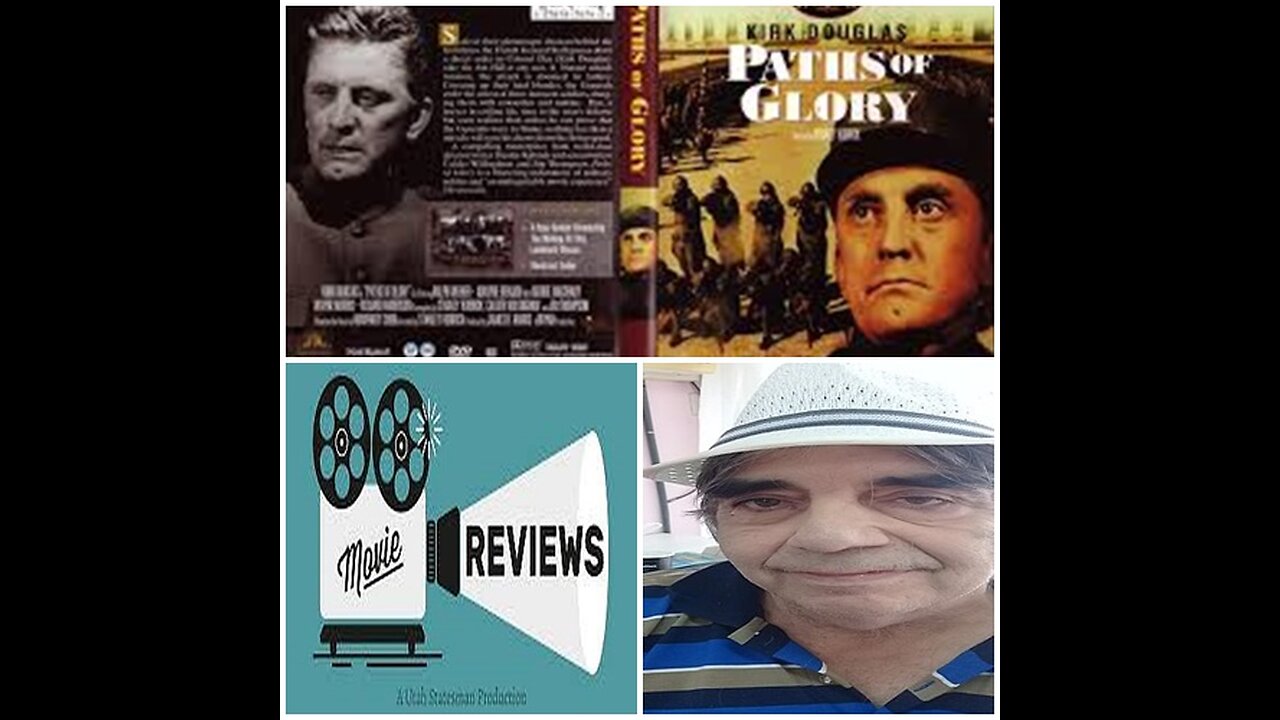
Paths Of Glory 1957 Movie Review
PATHS OF GLORY
(director/writer: Stanley Kubrick;
screenwriters: Jim Thompson/Calder Willingham/from a Humphrey Cobb novel;
cinematographer: Georg Krause; editor: Eva Kroll;
cast: Kirk Douglas (Colonel Dax),
Ralph Meeker (Corporal Paris),
Adolphe Menjou (General George Broulard),
George Macready (General Paul Mireau),
Wayne Morris (Lieutenant Roget),
Ralph Meeker (Corp. Paris),
Richard Anderson (Major Saint-Auban),
Joe Turkel (Private Arnaud),
Christiane Kubrick (German Singer),
Jeffrey Hausner (Proprietor), Peter Capell (Colonel Judge), Emile Meyer (Priest), Bert Freed (Sergeant Boulanger), Kem Dibbs (Private Lejeune),
Timothy Carey (Private Ferol),
Fred Bell (Shell Shock Victim),
Harold Benedict (Capt. Nichols), John Stein (Capt. Rousseau);
Runtime: 86; Bryna/Harris-Kubrick/United Artists; 1957)
"... as in most Kubrick films it is not dated, in fact, it seems to get better with age."
Reviewed by Dennis Schwartz
Stanley Kubrick's first big financed 'A' film and first film with a major Hollywood star. Kirk Douglas liked the script thinking it would give him a chance to work on a quality film with a strong social message, and thereby he got his production company to back it. Kubrick prior to this film was a photographer for Look magazine and directed the low-budget noir films "The Killers" (46) and "Killer's Kiss" (55). This film is based on a true event and was filmed in Germany, with the German extras playing the French soldiers in the trenches.
The film must have ruffled many feathers, because it was banned in France for about 20 years. The U.S. Army refused to show it on its theater release date. It was also banned for a time in Austria, Switzerland, Belgium, and Germany. This antiwar film, one of the best ever made, much like Renoir's masterpiece "The Grand Illusion," does a great job of criticizing the role of the French military higher-ups in WW1. The movie turns most of its attention to the action taking place in a military courtroom court-martial and the interplay between the officer's political maneuvering for power. It culminates in the unjustified court-martial for cowardice of three randomly picked soldiers, showing how callow the military is for taking these soldier's lives in so arbitrary a fashion. Its battle scenes played like a documentary, with striking attention turning to details of life in the trenches and how the men were confined to such dark and squalid circumstances, which is contrasted with how the staff officers live in the luxury of chateaus. Kubrick's masterpiece was more cynical and gritty than Renoir's very poetic and humane indictment of war. Kubrick hit harder at his insanity of war theme.
It should also be pointed out that the ambitious Kubrick rewrote the original script to give the film a more traditional Hollywood upbeat ending, much to Kirk Douglas's surprise and disapproval. Kubrick, reportedly, wanted the film to be a box office success and was willing to forgo some artistic integrity. The controversial ending might be termed a cop-out by many, while others found its sentimentality quite appropriate and cynical enough.
The two did not get along well on the set, but that did not stop Douglas from years later requesting the very talented Kubrick to direct "Spartacus (60)," the last Hollywood film Kubrick ever directed. Incidentally, in my opinion, the major flaw in Paths of Glory wasn't the taut script, which was lucid and hard-hitting, but it was in Kirk Douglas's far-reaching performance (though a strong performance and possibly the best one in Kirk's career). But, as forceful and necessary as Kirk's performance was, it still allowed the film to become centered around him rather than on the universality of the story unfolding in its very natural and engrossing way about the horrors, evils, and insanity of war.
Kubrick aimed for a critique both of war and of class systems. He accomplished this by pessimistically and cynically showing how the privilege class cares only about themselves and how its power is corrupting.
The action picks up in France in 1916. We are told that World War I has dragged on for two years and that it became a stalemate of fortified trenches and heavy casualties. War began between Germany and France on August 3, 1914. Five weeks later, the German Army had come within 18 miles of Paris. There the battered French miraculously rallied their forces at the Marne River and in a series of unexpected counterattacks, drove the Germans back. The Front was stabilized and shortly afterward developed into a continuous line of heavily fortified trenches zigzagging their way five hundred miles from the English Channel to the Swiss frontier. By 1916, after two grisly years of trench warfare, the battle lines had changed very little. Successful attacks were measured in hundreds of yards - and paid for in the lives taken of hundreds of thousands of soldiers.
The film opens with the French General Staff deciding from the safety of their luxurious chateau, far off enemy lines, that it is time to attack the “Ant Hill” tomorrow. The object of the attack is of no strategic value, an impregnable fortified hilltop held by the Germans. The two cunning and detestable generals--the commanding staff general, General George Broulard (Adolphe Menjou), who asks the field general, Paul Mireau (George Macready), to take this impossible suicide mission, despite knowing it will kill most of the men. At first Mireau says he can't do it, he will lose too many men. But then Broulard says that a promotion awaits, there will be consideration for another star. Mireau then consents and arrogantly visits the troops in the trenches, accompanied by his ass-kissing aide, Major Saint-Auban (Anderson). The general manages to slap a shell-shocked soldier (Bell) while rallying the troops, saying there is no such a thing as shell-shock. The general transfers him out of his outfit, not wanting cowards in his company.
The general confers with the company commander of the 701st, Colonel Dax (Kirk Douglas), a criminal trial lawyer in civilian life, and appeals to Dax's patriotism to go through with the attack. After Dax says it is not possible to do, Mireau says "Show me a patriot and I'll show you an honest man." Dax replies, quoting from Samuel Johnson, "Patriotism... is the last refuge of the scoundrel." Finally, Dax is convinced to lead the attack when he is threatened with loss of command. He then becomes subservient to the general and says he doesn't want to desert his men.
The attack the next morning is a colossal failure, as the men who do attack suffer heavy losses. It is made worst by a commanding officer’s cowardice, Lieutenant Roget (Wayne Morris), who never orders his men to leave the trenches, leaving the first line of soldiers without backup. Mireau watches the battle begin from the safety of his chateau, drinking a toast to France as the battle begins. Mireau soon becomes upset at the men for not taking the Ant Hill and for stopping their attack and orders the artillery commanders to fire on his own troops, which they refuse to do even when threatened with court-martial. They ask for that command to be a written one.
The next day Mireau meets with Broulard and requests that a 100 men be randomly chosen as scapegoats and executed as a lesson for cowardice in battle. He warns, this is to serve as a lesson for the rest of the troops. Broulard suggests that they make it 12 men. But Mireau, not to be undone in the generosity of the moment, says let's make it 3 and have the 701st's three commanding officers choose one from each outfit. Broulard says we better get a court-martial for them and make it legal. Dax when he hears of this insanity, asks to be the defense counsel for the accused and is granted that right.
Dax will meet the men chosen to die in their cell. They are Corporal Paris (Meeker), Private Arnaud (Turkel), and Private Ferol (Carey). All of them express shock at what has happened to them and how they were chosen. Corporal Paris was chosen by Lieutenant Roget because the officer murdered Lejeune (Dibbs) on patrol and Paris knew that. Arnaud, a former medal-awarded hero, was chosen by a random drawing of lots. The weepy Ferol was selected because his captain believed he was a "social undesirable." Since the trial is fixed, the men are found guilty and are given a last meal in their cells, which they refuse to eat because they think it is drugged. They are also visited by the priest (Meyer), who hears their confessions and offers what Arnaud calls sanctimonious pat answers for what has happened to them. Being drunk from the meal's wine, he attacks the priest but is knocked down by Paris causing him to be placed on a stretcher when the men are executed in the morning.
Dax had told General Broulard about the artillery commanders who were charging General Mireau with ordering his own men fired upon the night before the execution, giving him the written statements of all the witnesses who confirmed that this happened. But the general refused to stop the execution, instead he waited for after the execution to tell Mireau that there will be an investigation about that matter so the military name is not stained. Later, he calls Dax in and informs him that he can have Mireau's position. Angrily Dax turns him down as Broulard looks at him incredulously, as if he were a fool, saying you really cared about saving those three men: "You are an idealist." Dax reproves the generals on their despicable and inhumane actions, and is forever shut out of the privileged military club.
As Dax leaves the general, he comes across the men in a tavern where a young German woman (Kubrick's wife Christiane) is forced to sing as the men act like brutes. When she starts to sing and tears roll down her face, they eventually become quiet and are moved to softly sing along with her. Dax is told by his sergeant (Freed) that orders have come and that it is time for the men to return to the front. Dax tells him to give the men a few minutes.
The film is direct and powerful. It wouldn't have been banned for so long if it didn't hit home with its hard message. There is no doubt about its message being man's inhumanity to man, that war is insane, of military incompetence, of class differences resulting in special privileges for some, of hypocrisy, and most of all, that power is corrupting.
It is magnificently shot, as the trenches are frighteningly real and incomprehensible to understand until seen. Kirk Douglas is overwhelming in his stabilizing role, but in my opinion too much so. But, nevertheless, his anger is warranted, as he is the emotional glue that holds the film together and gives humanity some measure for hope. Though I came away from the film feeling no hope. I was cynical of everyone's motives, including Dax's. After all he still led the men to their slaughter, even when knowing this would be so. To call him a hero, as the ending of the film implies by its crass sentimentality, just left me with a cold feeling. A real hero is someone who is brave and beyond reproach, someone who would have become a pacifist after that incredulous suicide battle plan and mock trial. He would have walked away from the war.
Adolphe Menjou and George Macready came through with outstanding performances, each one an incarnation of Machiavellian evil. When on the screen, their performances are like machine-gun fire directed at you.
There is much to chew on as far as ideas, despite how simple the film might appear on first viewing, and thereby lies its true greatness. It seems to make a timeless argument against war; and, as in most Kubrick films it is not dated, in fact, it seems to get better with age.
REVIEWED ON 1/22/2000 GRADE: A+ Paths of Glory (1957)
BY ROGER EBERT / February 25, 2005
Stanley Kubrick's "Paths of Glory" (1957) closes with a scene that doesn't seem organic to the movie. We've seen harrowing battlefield carnage, a morally rotten court-martial, French army generals corrupt and cynical beyond all imagining, and now what do we see? Drunken soldiers, crowded into a bistro, banging their beer steins on the tables as the owner brings a frightened German girl onstage.
He makes lascivious remarks about her figure and cruel ones about her lack of talent, but she has been captured and must be forced to perform. Hoots and whistles arise from the crowd. The frightened girl begins to sing. The noise from the crowd dies away. Her tremulous voice fills the room. She sings "The Faithful Hussar." A hush falls, and some of the soldiers begin to hum the notes; they know the song but not the words.
If the singing of "La Marseillaise" in a bar in "Casablanca" was a call to patriotism, this scene is an argument against it. It creates a moment of quiet and tenderness in the daily horror these soldiers occupy -- a world in which generals casually estimated that 55 percent of these very men might be killed in a stupid attack and found that acceptable.
Songs at the ends of dramas usually make us feel better. They are part of closure. This song at the end of this movie makes us feel more forlorn. It is not a release, but a twist of Kubrick's emotional knife. When Truffaut famously said that it was impossible to make an anti-war movie, because action argues in favor of itself, he could not have been thinking of "Paths of Glory," and no wonder: Because of its harsh portrait of the French army, the film was banned in France until 1975.
The film, made in 1957, is typical of Kubrick's earlier work in being short (84 minutes), tight, told with an economy approaching terseness. Later his films would expand in length and epic scope, sometimes to their advantage, sometimes not. It does however contain examples of one of his favorite visual strategies, the extended camera movement that unfolds to reveal details of a set or location, and continues long after we expect it to be over.
Early in the film, the camera precedes its hero, Col. Dax (Kirk Douglas) on an inspection tour of a muddy fortified trench that goes on and on and on. Later the camera follows doomed men into No Man's Land, tracking alongside them through mud and shell blasts, trenches and craters, past bodies that drop before our eyes. Still later, there is a dolly shot through a formal ball to find a French general. And toward the end, an elaborate military parade for a firing squad, with the camera preceding three condemned men as they walk and walk and walk toward their deaths.
These shots of long duration impress the importance of their subjects upon us: The permanence of trench warfare, the devastation of attack, the hypocrisy of the ruling class, the dread of the condemned men. If some of Kubrick's later extended shots, including the endless tracking shot down long hotel corridors in "The Shining" (1979), seem like exercises in style, the shots in "Paths of Glory" are aimed straight at our emotions.
The story is simply summarized. French and German armies face each other along 500 miles of fortified trenches. Both sides have been dug in for two years. Any attempt at an advance brings a dreadful human cost in lives. The effete little Gen. Broulard (Adolphe Menjou) orders his subordinate, Gen. Mireau (George Macready), to take an impregnable German position, "The Anthill," by, incredibly, the day after tomorrow. Mireau argues that it cannot be done. Broulard thinks perhaps it can be accomplished with no more than 55 percent casualties. He hints that there is a promotion and a third star for the general who does it. The two-star Gen. Mireau goes through the motions of protest: "The lives of 8,000 men! What is my ambition against that? My reputation?" And then: "But, by god, we might just do it!"
Col. Dax must lead the charge. He knows it is doomed, and he protests, but he follows orders. In a scene set the night before the raid, a scene which in other language might have been conceived by Shakespeare, two of his men debate the merits of dying by machinegun or bayonet. One chooses the machinegun, because it is quick; while the bayonet might not kill, it would hurt. The other says that proves he is more afraid of pain than death.
The actual assault has a realism that is convincing even now that we have seen Stone's "Platoon" and Spielberg's "Saving Private Ryan." The black-and-white photography is the correct choice; this is a world of shapes and shadows, mud and smoke, not a world for color. The loss of life is devastating. The advance is halted. Watching from the safety of the trenches, Gen. Mireau decides the men are cowards and orders French artillery to fire on their own men, to drive them forward. The battery commander refuses to act without a written order.
At the end of the day, to save face and protect his promotion, Mireau orders that three men, one from each company, must be executed for cowardice. One is chosen by lot. One because he is "socially undesirable." One because he was an eyewitness to the cowardice of a superior officer, who abandoned a comrade on a reconnaissance mission. Dax is outraged and asks to act as defense counsel before the military tribunal, which is, as we expect, a farce. When Dax argues for the defense that any further advance was "impossible," the prosecutor snaps, "if it was impossible, the only proof of that would be their dead bodies at the bottom of the trenches." The survivors are obviously cowards, then, because they are alive.
That night, the condemned men share the same cell. "Do you see that cockroach?" one says. "Tomorrow morning I'll be dead, and it will be alive." The film until this point has been bitter and unromantic, but we think we glimpse a turn in the plot. Dax learns of Mireau's order to fire French artillery at French troops. He finds Gen. Broulard at a fancy ball and informs him of Mireau's artillery order. In any conventional war movie, in a film made by 99 directors out of 100, there would be an 11th-hour reprieve, the condemned men would be spared, and the stupid and treacherous Mireau would be publicly humiliated.
Not here. Kubrick finds a way to draw all his story threads tight without compromising his harsh and unforgiving theme. The plot is resolved, yes, but cruelty and duplicity survive, and private soldiers are still meaningless pawns. Broulard believes the executions will be "a perfect tonic" for the army: "One way to maintain discipline is to shoot a man now and then."
"Paths of Glory" was the film by which Stanley Kubrick entered the ranks of great directors, never to leave them. When I interviewed Kirk Douglas in 1969, he recalled it as the summit of his acting career: "There's a picture that will always be good, years from now. I don't have to wait 50 years to know that; I know it now." It has an economy of expression that is almost brutal; it is one of the few narrative films in which you sense the anger in the telling. Samuel Fuller, who fought all the way through World War II, remembered it in "The Big Red One" with nostalgia for the camaraderie of his outfit. There is no nostalgia in "Paths of Glory." Only nightmare.
Kubrick and his cinematographer, George Krause, use sharp and deep focus for every shot. There is not a single shot composed only for beauty; the movie's visual style is to look, and look hard. Kirk Douglas, a star whose intelligence and ambition sometimes pulled him away from the comfortable path mapped by the system, contains most of the emotion of his character. When he is angry, we know it, but he stays just within the edge of going too far. He remains an officer. He does his duty. He finds a way to define his duty more deeply than his superiors would have wished, but in a way, they cannot condemn.
And then that final song. It is sung by a young actress named Christiane Harlan, who soon after married Stanley Kubrick. One day in the summer of 2000, I visited her on their farm outside London, and we walked through the garden to the boulder engraved with Kubrick's name, under which he rests. I wanted to tell her how special and powerful that scene was, how it came out of nowhere to provide a heartbreaking coda, how by cutting away from his main story Kubrick cut right into the heart of it. But it didn't seem like the moment for film criticism, and I was sure she already knew whatever I could tell her.
A restored print of "Paths of Glory" opened Friday at the Music Box. Also read my 1969 Esquire interview with Kirk Douglas, and Great Movie reviews of Kubrick's "2001: A Space Odyssey" and "Dr. Strangelove, or How I Stopped Worrying and Learned to Love the Bomb" and Fuller's "The Big Red One."
Rev 2
“Yet knowing how way leads on to way,
I doubted if I should ever come back.
I shall be telling this with a sigh
Somewhere ages and ages hence.” - Robert Frost
There are many avenues available that will lead travelers to that moment in a special realm where they receive praise and honor for their efforts. Yet as we are reminded in the last scene of Patton, that moment is always fleeting. Sometimes that moment is marked by heroism, bravery, or some Herculean accomplishment. Other times, actions are remembered as having shown cowardice in the face of the enemy. No other form of human endeavor provides more opportunities for both than war.
The Criterion Collection will release Paths of Glory on DVD, October 26, 2010, adding to their already impressive inventory of classic and contemporary films. The transfer from film to disc was supervised by Leon Vitali, who was Kubrick’s technical assistant. Vitali’s efforts are detailed in a sixteen-page booklet that accompanies the DVD and features an interesting and informative essay by James Naremore about the movie’s plot and action.
Stanley Kubrick started out as an apprentice photographer for Look magazine in 1946 and later became a full time staff photographer there. He did three documentary films in the early fifties and in 1957 did Paths of Glory, his fourth feature film. Even the casual viewer can see the influence of his still photography experience in almost every scene.
Never one to shy away from controversial topics, Kubrick embraces execution for cowardice (by firing squad) here - as well as the arrogance of officers. Private Eddie Slovik was the last American executed by the United States for cowardice and that happened in Word War II about the time of the Battle of the Bulge, as Hitler’s panzers attacked in the Hurtgen Forest. Slovik was arrested for his actions. In Paths of Glory, the French soldiers executed were chosen to die, one by drawing lots, as representatives of their inadequate unit. Here‘s another irony of war. It’s unimaginable that in today’s society, an American serviceperson would be chosen at random for capital punishment. We send our young men to die in battle but wouldn’t think of drawing lots to hang one. Apparently, in The Great War, this was acceptable, at least by French standards (as was a superior officer slapping an enlisted man).
A penetrating study of several characters, their motives, and reactions to life and war, Paths of Glory withstands the test of time - a true classic. One battle scene is enough to make the necessary points as battlefield technology changes, the motives and actions of men repeat themselves in each generation. If you haven’t seen Paths of Glory, now is the time. If you have seen it, see it again in a new light. For me, it ranks right up there with Patton and Schindler’s List on my short list of great war movies.
[The Criterion Collection release of Paths of Glory bonus features include interviews with the director, producer, and actress, Christiane Kubrick, and a commentary by film critic Gary Giddins. In addition, a French television piece about an actual execution that influenced the film is shown.]
Cast
Cast overview, first billed only:
Kirk Douglas ... Col. Dax
Ralph Meeker ... Cpl. Philippe Paris
Adolphe Menjou ... Gen. George Broulard
George Macready ... Gen. Paul Mireau
Wayne Morris ... Lt. Roget
Richard Anderson ... Maj. Saint-Auban
Joe Turkel ... Pvt. Pierre Arnaud (as Joseph Turkel)
Christiane Kubrick ... German Singer (as Susanne Christian)
Jerry Hausner ... Proprietor of Cafe
Peter Capell ... Narrator of Opening Sequence / Chief Judge of Court-Martial
Emile Meyer ... Father Dupree
Bert Freed ... Sgt. Boulanger
Kem Dibbs ... Pvt. Lejeune
Timothy Carey ... Pvt. Maurice Ferol
Fred Bell ... Shell-Shocked Soldier
BAFTA Awards 1958
Nominee
BAFTA Film Award Best Film from any Source
USA.
Grand Prix de l'UCC 1959
Winner
Grand Prix de l'U
-
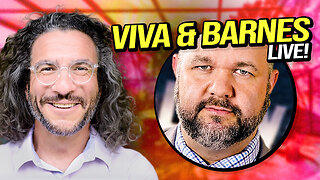 2:29:27
2:29:27
vivafrei
12 hours agoEp. 245: Los Angeles ON FIRE! Gavin Newsom FOR JAIL? Trump SENTENCED! Pardons & MORE! VIva & Barnes
118K168 -
 LIVE
LIVE
Nobodies Live
3 hours ago $0.99 earnedNobodiesLive - Rumble Music TEST STREAM 2.0
364 watching -
 LIVE
LIVE
EricJohnPizzaArtist
2 hours agoAwesome Sauce PIZZA ART LIVE Ep. #30: Classic Gaming!
275 watching -
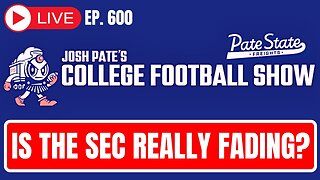 1:18:42
1:18:42
Josh Pate's College Football Show
4 hours ago $0.27 earnedSEC Dominance Over | National Title Thoughts | Miami QB & DC Moves | Wrong About the Playoff?
7.1K2 -
 LIVE
LIVE
Vigilant News Network
8 hours agoIvermectin & Fenbendazole Cancer Secrets Revealed w/ Dr. William Makis | Media Blackout
1,931 watching -
 4:17:11
4:17:11
GamerGril
6 hours agoPRACTICE THOSE DROP KICKS | DEAD ISLAND 2
45.1K4 -
![Super Smash Bros Ultimate - Adventure Mode [Part 2]](https://1a-1791.com/video/fwe2/d9/s8/1/B/p/i/F/BpiFw.0kob-small-Super-Smash-Bros-Ultimate-A.jpg) 6:06:11
6:06:11
JdaDelete
9 hours ago $5.30 earnedSuper Smash Bros Ultimate - Adventure Mode [Part 2]
61.3K3 -
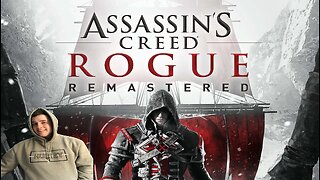 3:53:21
3:53:21
GlizzyPrinceChristian
22 hours agoThis Game Literally is a Master Piece of Terrible Acting But the Combat is Good
65.2K -
 5:54:33
5:54:33
ttvglamourx
9 hours ago $4.83 earnedSUB SUNDAY !DISCORD
58.4K6 -
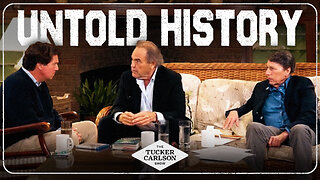 1:42:38
1:42:38
Tucker Carlson
2 days agoOliver Stone & Peter Kuznick: War Profiteering, Nuclear Tech, NATO v. Russia, & War With Iran
215K431